Scotland has elections to several bodies: the Scottish Parliament, the United Kingdom Parliament, the European Parliament, local councils and community councils.

Elections to Angus Council were held on 3 May 2012 the same day as the other Scottish local government elections. The election used the eight wards, created as a result of the Local Governance (Scotland) Act 2004, with each ward electing three or four Councillors using the single transferable vote system a form of proportional representation, with 29 Councillors being elected.

Elections to Dundee City Council were held on 3 May 2012 on the same day as the other Scottish local government elections. The election used the eight wards created as a result of the Local Governance (Scotland) Act 2004, with each ward electing three or four Councillors using the single transferable vote system a form of proportional representation, with 29 Councillors elected.

Elections to Aberdeenshire Council were held on 3 May 2012, on the same day as the other Scottish local government elections. The election used the 19 wards created as a result of the Local Governance (Scotland) Act 2004, with each ward electing three or four Councillors using the single transferable vote system a form of proportional representation, with 68 Councillors being elected.
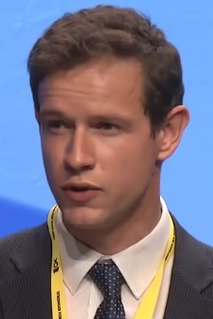
The 2012 Aberdeen City Council election took place on 3 May 2012 to elect members of Aberdeen City Council. The election used the 13 wards created as a result of the Local Governance (Scotland) Act 2004, with each ward electing three or four Councillors using the single transferable vote system a form of proportional representation, with 43 Councillors elected.

Elections to the City of Edinburgh Council were held on 3 May 2012, the same day as the Scottish local elections, 2012. The election was the second using 17 new wards created as a results of the Local Governance (Scotland) Act 2004, each ward elected three or four Councillors using the single transferable vote system a form of proportional representation system of election.
Elections to Perth and Kinross Council were held on 3 May 2012, the same day as the other Scottish local government elections. The election used the twelve wards created as a result of the Local Governance (Scotland) Act 2004, with each ward electing three or four councillors using the single transferable vote system a form of proportional representation, with 41 Councillors being elected.
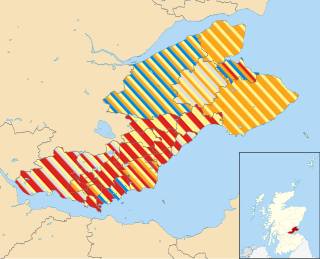
Elections to Fife Council were held on 3 May 2012, the same day as the other Scottish local government elections. The election used the 23 wards created as a result of the Local Governance (Scotland) Act 2004, with each ward electing three or four Councillors using the single transferable vote system a form of proportional representation, with 78 Councillors elected.
Elections to Stirling Council were held on 3 May 2012, the same day as the 31 other local authorities in Scotland. The election will use the seven wards created under the Local Governance (Scotland) Act 2004, with 22 councillors being elected. Each ward will elect either 3 or 4 members, using the STV electoral system.
Elections to Inverclyde Council were held on 3 May 2012, the same day as the other 31 local authorities in Scotland. The election used the six wards created as a results of the Local Governance (Scotland) Act 2004, with each ward electing three or four Councillors using the single transferable vote system a form of proportional representation, with 20 Councillors being elected in total.

Elections to Scottish Borders Council were held on 3 May 2012, the same day as the other Scottish local government elections. The election used the 11 wards created as a result of the Local Governance (Scotland) Act 2004, with each ward electing three or four Councillors using the single transferable vote system, a form of proportional representation, with 34 Councillors elected.

Elections to East Lothian Council were held on 3 May 2012, on the same day as the other Scottish local government elections. The election used the 7 wards created as a result of the Local Governance (Scotland) Act 2004, with each ward electing three or four councillors using the single transferable vote system a form of proportional representation, with 23 councillors elected.
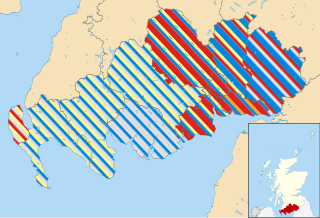
The 2012 Dumfries and Galloway Council election took place on 3 May 2012 to elect members of Dumfries and Galloway Council. The election used the thirteen wards created as a result of the Local Governance (Scotland) Act 2004, with each ward electing three or four councillors using the single transferable vote system a form of proportional representation, with 47 councillors being elected.
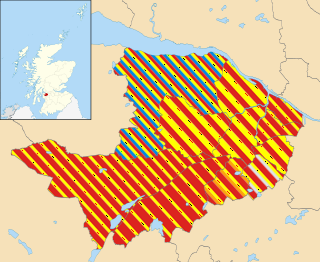
The 2012 Renfrewshire Council election took place on 3 May 2012 to elect members of Renfrewshire Council. The election used the eleven wards created as a result of the Local Governance (Scotland) Act 2004, with each ward electing three or four Councillors using the single transferable vote system a form of proportional representation, with 40 Councillors being elected.
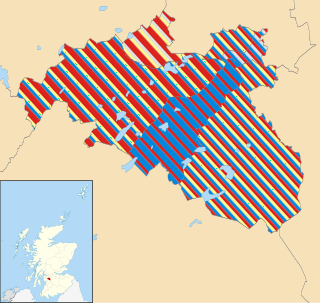
The 2012 East Renfrewshire Council election took place on 3 May 2012 to elect members of East Renfrewshire Council. The election used the six wards created as a result of the Local Governance (Scotland) Act 2004, with each ward electing three or four Councillors using the single transferable vote system a form of proportional representation, with 20 Councillors being elected.
Elections to East Dunbartonshire Council were held on 3 May 2012, the same day as the 31 other local authorities in Scotland. The election used the eight wards created under the Local Governance (Scotland) Act 2004, with 24 Councillors being elected. Each ward elected either 3 or 4 members, using the STV electoral system.

Elections to Dundee City Council were held on 4 May 2017 on the same day as the other Scottish local government elections. The election used the eight wards created as a result of the Local Governance (Scotland) Act 2004, with each ward electing three or four Councillors using the single transferable vote system. A total of 29 Councillors were elected.

Elections to Fife Council were held on 4 May 2017, the same day as the other Scottish local government elections. The election used the 22 wards created as a result of the Local Government Commission for Scotland's 5th review which was published in September 2016, with each ward electing three or four councillors using the single transferable vote system a form of proportional representation, with 75 councillors elected; a decrease of three seats from 2012 as one ward, The Lochs, was abolished.
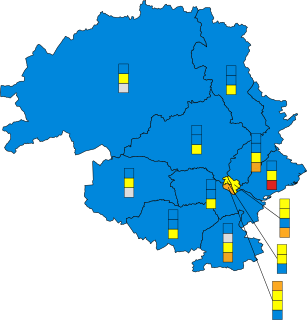
Elections to Perth and Kinross Council were held on 4 May 2017, the same day as the other Scottish local government elections. The election covered the twelve wards created as a result of the Local Governance (Scotland) Act 2004, with each ward electing three or four councillors using the single transferable vote system a form of proportional representation, with 40 Councillors being elected, a reduction of 1 member compared to 2012.
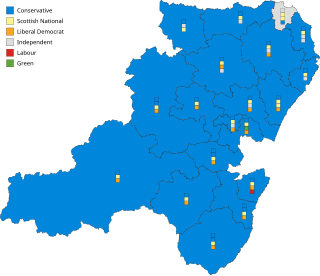
The Aberdeenshire Council election of 2017 was held on 4 May 2017, on the same day as the other Scottish local government elections. The election will use the 19 wards created as a result of the Local Governance (Scotland) Act 2004, with each ward electing three or four councillors using the single transferable vote system a form of proportional representation, with 70 councillors being elected, an increase of one member compared to 2012.
















